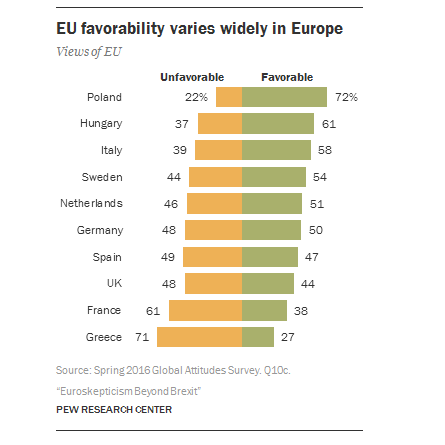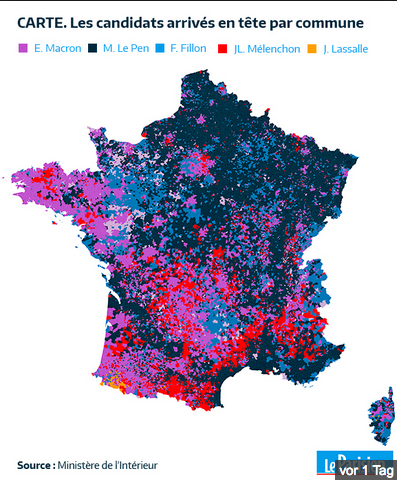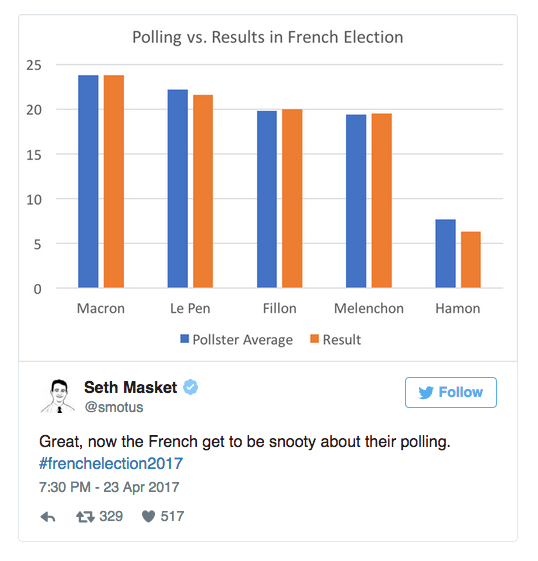
In France’s Sunday Election, voters chose two outsiders with very different visions to enter the runoff for the next French President. Marine Le Pen is a far-right politician, while newcomer Emmanuel Macron envisions a more business-friendly France. Why does the French election matter enough to take up a full post?
The significance of the French presidential election
First of all, France is the sixth-largest economy in the world and a key founder of the European Union (EU). France is also one of the five members of the UN Security Council and historically a strong ally of the US. On April 23, The New York Times called this “the most consequential election in recent history” (Emmanuel Macron and Marine Le Pen Advance In French Election).
Secondly, I firmly believe that we can thank the EU for widespread political stability since WWII. From an American perspective, the political and economic union of 28 European countries may seem weird. However, as a woman in my 40s, I’m the result of its expansion since the 80s. Born and raised in France, I moved to Germany as a young adult. I lived and worked around Frankfurt for over 20 years, met my French husband there, and experienced the birth of three of our children. Without this background, I probably wouldn’t have relocated to the US in 2013.
Thirdly, after the Brexit shock, experts agree that “Frexit,” a common name for the hypothetical French withdrawal from the European Union, would mean the end of the EU. Five of the 11 French candidates supported withdrawal, but Macron clearly embraced an unpopular construct. In a PEW Research Center poll from 2016, 61% of French people had an unfavorable view of the EU.

With all this in mind, how will people vote in the second round? Macron is a former investment banker and was Minister of Economy under the current Socialist president. In 2016, he left this government position and launched his own political movement. According to The New York Times, “Mr. Macron represents a more educated and cosmopolitan France. His voters are not all privileged … but they believe that looking beyond the country’s borders will enrich them … economically and culturally.”
However, “Ms. Le Pen’s voters want a government that protects them from the vicissitudes of the market place and closes its borders to outsiders, re-establishing the frontiers that have been largely erased by the European Union.”
What does the initial result mean?
French voters decided to change the political status quo. Besides Le Pen and Macron, the far-left presidential candidate Mélenchon made 19.5% of the votes. Together, the three candidates earned almost two-thirds of the votes!
Again, The New York Times noted that “The result was a full-throated rebuke of France’s traditional mainstream parties, setting the country on an uncertain path in an election that could also decide the future of the European Union.”
For The LA Times, “The two-week runoff campaign promises to be a battle for the soul of France that will decide not only the country’s future, but that of the EU.”
At least the stock market is enjoying the election result. According to CNN Money, “Investors around the world cheered the French presidential election results. The hope is that the centrist candidate Emmanuel Macron will have no problem defeating the anti-EU challenger Marine Le Pen in a runoff election on May 7.”
Personally, I’m not so sure that the outcome will be that simple.
How does the French election compare to the American election?
Of course, the comparison isn’t exact because France has a two-round election system. The first round included 11 candidates representing all political opinions, from far extremes (left or right) to conservative or central positions. Since nobody won 50% of the casted votes, the two leading candidates, Le Pen and Macron, will head into a runoff on May 7.
But, after putting the election procedures by side, I think that France faces the same phenomenon as the United States. In the voting map below, I see a cleavage in my birth country.

There are indeed two cleavages: one is regional (Eastern France voted for Le Pen, while western France voted for Macron), the other is between urban and rural areas: Larger cities voted for Macron. One has to know France well to recognize the cities on the map; however, the east-west cleavage is more obvious.
Workers and other smaller-wage employees don’t vote left anymore; instead, they want strong leaders with a simple rhetoric. Overall, Trump and Le Pen share the same narrative: “I know where your problems are coming from: immigrants took your jobs, and the government failed you again and again. I will fix the problem, believe me.”
My father was a racist all his life, but he voted left. In 1981 I remember him enjoying the election of Socialist François Mitterand, while my mother was devastated. But, after he got laid off, I’m not sure that he didn’t start voting for the former Le Pen (Marine’s father, founder of the right-wing nationalist party Front National).
My father’s story isn’t anecdotal evidence. In a report for the German radio broadcast Bayern5, French sociologist Didier Eribon explains the far-right party’s success. After the fall of the Soviet Union, the French Communist Party lost influence. At the same time, large industry complexes disappeared, and unemployment went up. As long as the French people and immigrants worked side by side, they stood in solidarity against management. Once jobs were lost, however, the Front National party gained influence. In 2015 during the last general election, 51% of workers voted for Le Pen, said Eribon.
Fun facts from the French election
At least the polls were right! On Tuesday, April 24, The Washington Post dedicated a full article to French polling. I encourage you to read it, as it explains how the French polling companies learned from their mistakes in the past: “French Election: How the Pollsters Got the Last Laugh.”

What happens next?
The runoff is happening on May 7. I will cast my vote the day before at the French Embassy. On Sunday evening, we will know who is the next French president.
Whichever candidate wins, he or she will not have a simple governing experience. In June, I will vote again for the National Assembly (kind of like the Senate and House of Representatives in the States). The President must then nominate a Prime Minister who reflects the will of the majority at the National Assembly.
Whoever wins, it won’t be easy.




very nice summary. very rich with quotes.
🙏
Thank you, you made my day Bobby!
Another very important difference with the USA is that French vote directly to elect the President, not the electoral college. For this reason, Macron will win.
Good point Eve!
It’s the same in Germany where you vote for a party, and not for a person. In both cases, I just feel that you know who you’re voting for, even if it’s not a direct vote, don’t you?